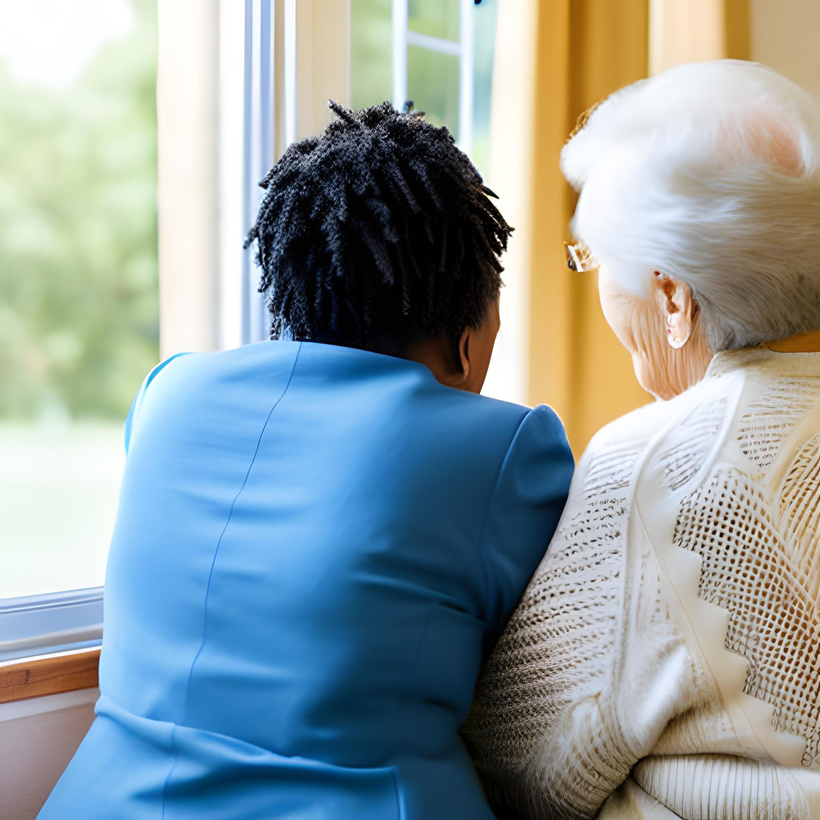Caring for someone with Alzheimer’s disease, dementia and other memory loss
Caring for someone with Alzheimer’s, dementia, or other memory loss or cognitive disorders can be challenging and overwhelming. To support caregivers in their journey, we’ve created a comprehensive journal, available in digital form here and coming soon to print, designed to track cognitive health, medications, and activities of daily living (ADLs). This valuable resource aims to provide caregivers and families with an objective, organized record of their loved one’s health and well-being, which can facilitate better communication with medical providers and family members and ensure the best possible care for family caregivers and their loved one.
In this blog post, we’ll discuss the Saint Louis University Mental Status (SLUMS) examination as the foundation of the journal’s weekly touchpoint, delve into the importance of tracking medications and ADLs, and explain how incorporating pain and mood tracking can create a well-rounded picture of an individual’s overall health.
The SLUMS Examination – A Comprehensive Cognitive Assessment Tool
The Saint Louis University Mental Status (SLUMS) examination is a brief cognitive assessment tool developed by researchers at Saint Louis University to evaluate cognitive function in older adults, specifically those with Alzheimer’s, dementia, and other memory loss or cognitive disorders. Introduced in 2006 by researchers, SLUMS has become widely used by healthcare professionals to identify cognitive impairment and track changes over time.
SLUMS is similar in form to other cognitive assessment tools like the Montreal Cognitive Assessment (MoCA) and the Mini-Mental State Examination (MMSE), which are designed to evaluate various cognitive domains, such as memory, attention, language, and visuospatial skills. However, SLUMS is considered more sensitive to mild cognitive impairment (MCI) and early-stage dementia than the MMSE, and it covers a broader range of cognitive domains than MoCA.
By incorporating SLUMS-based questions into the caregiver’s journal’s weekly touchpoint, caregivers can keep an objective record of their loved one’s cognitive performance. This information is invaluable when discussing their loved one’s condition with medical providers, as it can help identify early signs of mild cognitive impairment or decline, track progression, and inform treatment decisions.
A full version of the SLUMS examination, including scoring, may be found here: https://geriatrictoolkit.missouri.edu/cog/slumsexam_05.pdf. And while this can be a helpful guide, it should not be used to treat or diagnose disease. Always consult with your doctor or a healthcare provider who in addition to any of these examinations may utilize other testing to determine a diagnosis and any treatment regime.
Tracking Medication – A Vital Component of Caregiver Support

Proper medication management is crucial for patients and people living with Alzheimer’s, dementia, and other cognitive disorders. The caregiver’s journal includes a dedicated section to track medication, making it easy to maintain an accurate, up-to-date list of all prescriptions, dosages, and administration times.
This medication list serves multiple purposes. First, it helps caregivers ensure their loved one takes the correct medications at the right times, preventing missed or double doses. Second, it can be shared with healthcare providers to review possible drug interactions, side effects, or changes in effectiveness. Third, the medication list can be torn out and used as an emergency grab-and-go resource, ensuring that vital information is readily available in case of hospital visits or other urgent situations.
Monitoring ADLs, Pain, and Mood – A Holistic Approach to Care

Activities of Daily Living (ADLs) are essential tasks that individuals perform independently to maintain their well-being, such as bathing, dressing, eating, and toileting. Tracking ADLs in the caregiver’s journal provides an objective illustration of any changes in the patient’s ability to perform these tasks, which can be indicative of further cognitive or physical decline.
By closely monitoring ADLs, caregivers can better understand their loved one’s needs and adapt their care plan accordingly. Additionally, sharing this information with healthcare providers can help identify areas of concern and facilitate the development of targeted interventions to improve the patient’s quality of life.
Pain and mood tracking or other behavioral symptoms is an example of another important aspect of the caregiver’s journal. Individuals with Alzheimer’s disease, dementia, and other cognitive disorders may have difficulty expressing or even recognizing their own discomfort and emotional states. As a result anxiety, pain, and mood-related symptoms can often go unnoticed or be misunderstood.
By consistently documenting pain levels and mood changes, caregivers can create a more comprehensive picture of their loved one’s overall well-being. This information can help identify patterns or potential triggers and provide valuable insight into how different factors, such as changes in medication, diet, environment, or daily routines, affect the person’s emotional and physical state.
Sharing pain and mood tracking data with healthcare providers enables them to better understand the patient’s experience and develop tailored interventions to address these issues, ultimately improving their overall quality of life.
Addressing Caregiver Burnout – The Importance of Self-Care

Daily Motivational Sayings: Inspirational quotes and sayings are included in the journal to provide caregivers with a daily dose of encouragement and motivation. These positive affirmations can help set the tone for the day and serve as a reminder of the vital role caregivers play in their loved one’s life.
Making Today Great: The journal provides a space for caregivers to list things they can do to make each day more enjoyable and fulfilling, both for themselves and their loved one. This section encourages caregivers to be proactive in seeking out positive experiences, promoting a sense of accomplishment and satisfaction.
Three Good Things: Focusing on the positives is essential for maintaining a healthy mindset. The journal includes a section for caregivers to reflect on daily activities and document three good things that happened each day. This practice helps cultivate gratitude and shifts the focus from the challenges of caregiving to the meaningful moments and small victories that occur throughout the day.
Final Thoughts and Reflections: At the end of each day, the journal offers a space for caregivers to record their thoughts, feelings, and reflections. This process allows caregivers to process their experiences, gain perspective, and identify areas of personal growth or areas where additional support may be needed.
Valuable Resources for Memory Issues and Caregiver Support

In addition to utilizing the caregiver’s journal, it’s essential to be aware of the numerous resources available to support individuals with memory issues and their caregivers. Here are three reputable organizations that provide a wealth of information, services, and assistance with memory problems:
Alzheimer’s Association
The Alzheimer’s Association is a leading voluntary health organization dedicated to Alzheimer’s care, support, and research. They offer a wide range of services, including educational resources, support groups, care consultations, clinical trials, research, and community programs for individuals affected by Alzheimer’s and their caregivers.
Website: https://www.alz.org/ 24/7 Helpline: 1-800-272-3900
The helpline provides around-the-clock assistance, connecting callers to information, resources, and emotional support from trained professionals.
Area Agency on Aging
The Area Agencies on Aging (AAA) are local organizations across the United States that provide a variety of services and support to older adults and their caregivers. These services may include information and referral, benefits counseling, further education, caregiver training, and respite care, among others. AAAs work to ensure that older adults can maintain their independence and age in place within their communities.
To find your local AAA, visit the Eldercare Locator website at https://eldercare.acl.gov/ or call 1-800-677-1116 to connect with resources and services in your area.
Programs for All-Inclusive Care for the Elderly (PACE)
PACE is a Medicare and Medicaid program designed to provide comprehensive, coordinated care for older adults with chronic health conditions. The goal of PACE is to help individuals maintain their independence and stay in their communities by offering a wide range of services, such as primary care, prescription medications, physical therapy, and education and transportation to medical appointments.
For more information about PACE and to find a PACE program near you, visit the National PACE Association website at https://www.npaonline.org/.
Conclusion
The caregiver’s journal is a comprehensive resource that addresses the multifaceted needs of those caring for individuals with Alzheimer’s, dementia, and other cognitive disorders. By incorporating cognitive assessment tools, medication tracking, ADL monitoring, pain and mood tracking, and self-care strategies, this journal empowers caregivers to provide the best possible care for their loved one while also prioritizing their own well-being. With consistent use, caregivers can gain invaluable insights, improve communication with healthcare professionals and providers, and foster a more positive, resilient mindset in the face of the challenges associated with caregiving.

